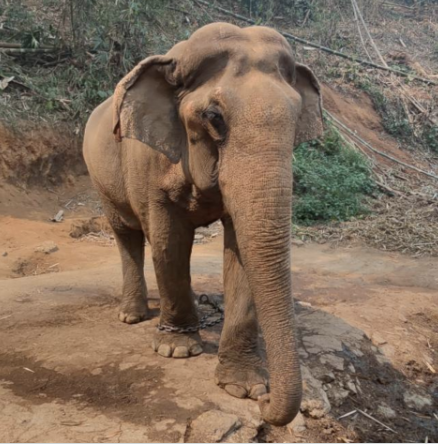At the start of April, the Chiang Mai University Mobile Vet Clinic teamed up with the Thai Elephant Conservation Center (TECC), the Asian Elephant Foundation of Thailand and the Department of Livestock Development to head to the areas of Tak and Omkoi to do elephant health checks on elephants that were returning with their owners to the area.
Each year in April, elephants from the region make their way home to Tak for the ritual of Rub Kwong Chang, known for helping the elephants and the Karen people live happy and prosperous lives, free from disease. The teams visited elephants in four districts of Tak and one district of Chiang Mai checking microchip numbers, administering anti-parasitic drugs and delivering other medical supplies, as well as giving advice on care and welfare to the mahouts.
Female elephant, with her calf by her side, receives an exam and anti-parasitic medication from Dr. Eye with the CMU Mobile Vet Clinic
The remainder of the month was spent in the areas of Mae Tang and Mae Wang visiting a number of elephants with a variety of ailments ranging from foot to gastrointestinal to eye problems.
On April 19, the team made a follow up visit to a bull elephant with a corneal abrasion and conjunctivitis in his right eye they had seen the previous month.
Bull elephant diagnosed with cataracts (or clouding of the eye lens) in his right eye has received ongoing care from the CMU Mobile Vet Clinic
At the last visit, the veterinarians had discovered damage to the elephant’s optic nerve, not rendering him blind, but still unable to see normally. Treatment for his condition included eye drops and vitamin B complex to maintain the bull’s nervous system. At this visit, the veterinarians discovered cataracts in his right eye. Since surgery is not an option, they suggested continuing the vitamin B and avoiding being out of the sun.
Next, the Mobile Clinic traveled to make another follow up visit to a female elephant in Mae Wang whom they had treated for a jaw abscess in March. The abscess is healing with proper cleaning being done by the mahout. However, since it is a large abscess below the skin it will take longer to heal. The wound remains open, allowing for discharge to continue to drain, and the elephant is otherwise healthy. The veterinarians administered a tetanus injection and advised the mahout to continue with wound care.
To wrap up the month, the team visited an elephant who was suffering from a back ache for about two days. The veterinarians noted warm areas on the caudal (rear) region of the female’s back and she had a pain response during the physical examination.
CMU team used thermal imaging to diagnose and laser therapy to assist with pain relief for this elephant in Northern Thailand
The thermal camera was used in order to confirm the areas of inflammation. Treatment included laser therapy to the areas of swelling, in addition to massage oil and anti-inflammatory medication.
To show your support for the tireless work of the CMU Mobile Vet Clinic and to celebrate World Veterinary Day, please visit our website to make a contribution.





